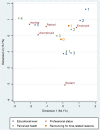Renouncing care in French Guiana: the national health barometer survey
- PMID: 30728033
- PMCID: PMC6366016
- DOI: 10.1186/s12913-019-3895-6
Renouncing care in French Guiana: the national health barometer survey
Abstract
Background: In French Guiana, health inequalities are patent for a broad range of pathologies for all age groups. The objective of the present study was to quantify the proportion of the population that had renounced care in the past year, to study predictive factors, and to compare results with other French territories.
Methods: A two-stage random sample of 2015 individuals aged 15 to 75 years was surveyed by telephone. A descriptive analysis of variables relative to renouncing care, use of health care, screening, and vaccination was initially performed. Multivariate analysis was then used to determine variables associated with renouncing care for financial reasons and renouncing for reasons linked to time were directly estimated using a Poisson model on weighted data. Variables with a significance level < 0.2 in the bivariate analysis were included in the full multivariate model.
Results: In French Guiana, during the past 12 months, 30.9% of surveyed persons renounced care whatever the type for financial reasons. Results of the multivariate analysis showed that gender, perceived financial situation, perceived health and complementary insurance status were independent predictive factors of care renouncement for financial reasons. Overall, 24% of the surveyed population declared having renounced to care for time-related motives. The independent predictors for time-related renouncing were different than those for renouncing care for financial reasons: a higher education level and a poor perceived health were independently associated with time-related renouncement; retired persons and students were found to renounce care less frequently than persons with a job.
Conclusions: Renouncing for financial reasons, a major target of the 2016 health law, represented a public health problem in French Guiana. Renouncing for lack of time was an important motive for renouncing, which is aggravated by the insufficient number of health professionals, but may benefit from organizational solutions. There are avenues for improvement of health for the most vulnerable: promote health, act on risk factors, and facilitate the readability and accessibility of the health system. Recent reforms to stabilize health insurance may however have some adverse consequences for migrants.
Keywords: French Guiana; Health inequalities; Health insurance coverage; Health system use; Renouncing care.
Conflict of interest statement
Ethics approval and consent to participate
The survey was approved by the French Data Protection Authority: Commission Nationale de l’Informatique et des Libertés (CNIL). In accordance with the guidelines of the French Data Protection Authority (CNIL), all included subjects gave informed consent to participate in the study before the telephone interview. Parental consent was obtained for participants under 16.
Consent for publication
Not applicable.
Competing interests
The authors declare no competing interests.
Publisher’s Note
Springer Nature remains neutral with regard to jurisdictional claims in published maps and institutional affiliations.
Figures


References
-
- Richard Wilkinson MM. Social determinants of health: the solid facts: WHO; 2003.
Publication types
MeSH terms
LinkOut - more resources
Full Text Sources
Medical
Miscellaneous

